BScN Year 4 Level Expectations
VerifiedAdded on 2019/10/18
|6
|1835
|451
Report
AI Summary
This document outlines the leveled expectations for fourth-year Bachelor of Science in Nursing (BScN) students. It details the required competencies across several key areas: Professional Responsibility and Accountability, Specialized Body of Knowledge, Competent Application of Knowledge, Ethical Practice, Service to the Public, and Self-Regulation. Each section lists specific learning outcomes and corresponding College of Nurses of Ontario (CNO) competencies that students must demonstrate. The report provides a detailed breakdown of expectations for each competency, differentiating between the minimum level of achievement and the expected level of proficiency for a fourth-year student. The document emphasizes the importance of professional conduct, ethical decision-making, client-centered care, and continuous self-improvement. It serves as a guide for students to understand the standards they need to meet to successfully complete their BScN program.
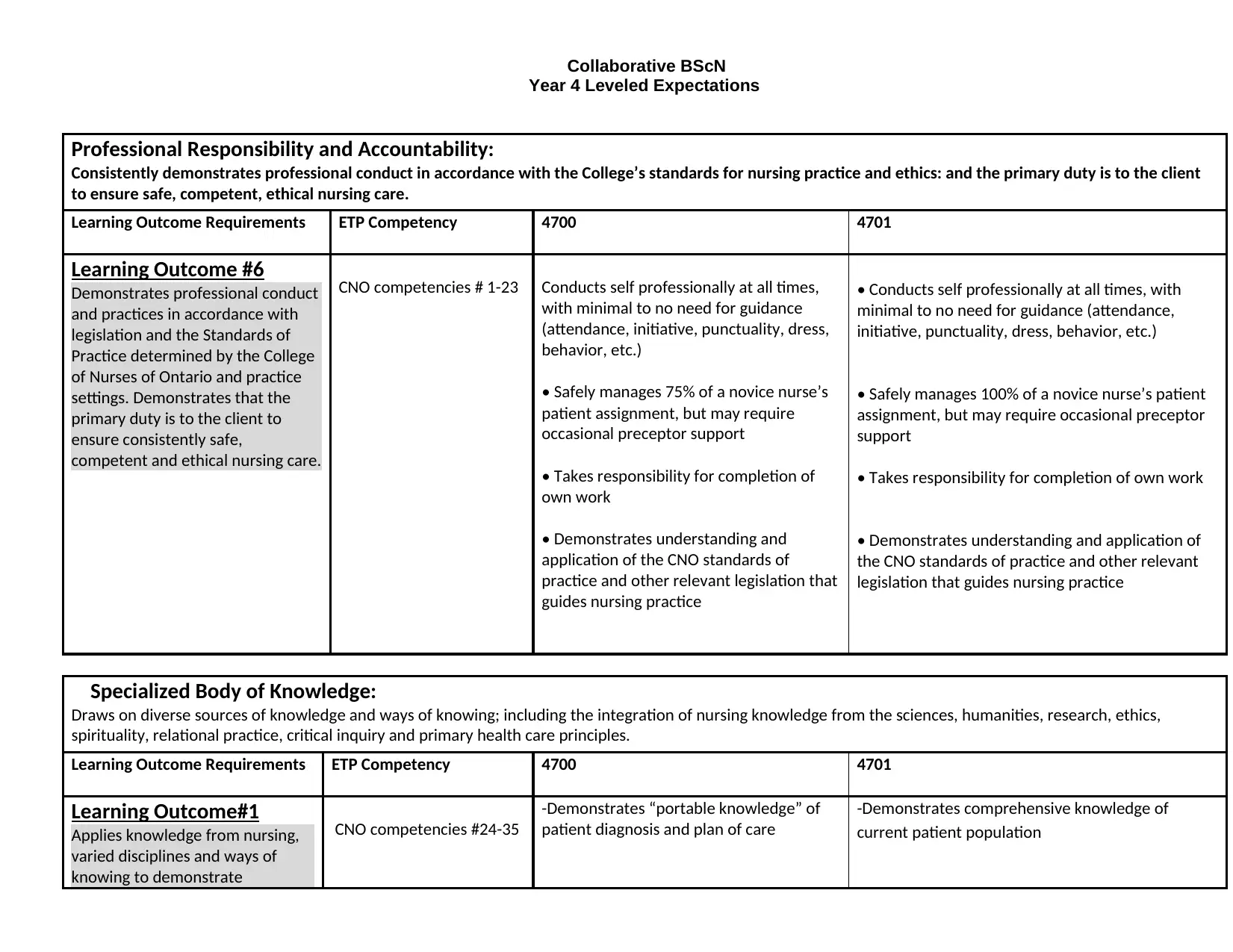
Collaborative BScN
Year 4 Leveled Expectations
Professional Responsibility and Accountability:
Consistently demonstrates professional conduct in accordance with the College’s standards for nursing practice and ethics: and the primary duty is to the client
to ensure safe, competent, ethical nursing care.
Learning Outcome Requirements ETP Competency 4700 4701
Learning Outcome #6
Demonstrates professional conduct
and practices in accordance with
legislation and the Standards of
Practice determined by the College
of Nurses of Ontario and practice
settings. Demonstrates that the
primary duty is to the client to
ensure consistently safe,
competent and ethical nursing care.
CNO competencies # 1-23 Conducts self professionally at all times,
with minimal to no need for guidance
(attendance, initiative, punctuality, dress,
behavior, etc.)
• Safely manages 75% of a novice nurse’s
patient assignment, but may require
occasional preceptor support
• Takes responsibility for completion of
own work
• Demonstrates understanding and
application of the CNO standards of
practice and other relevant legislation that
guides nursing practice
• Conducts self professionally at all times, with
minimal to no need for guidance (attendance,
initiative, punctuality, dress, behavior, etc.)
• Safely manages 100% of a novice nurse’s patient
assignment, but may require occasional preceptor
support
• Takes responsibility for completion of own work
• Demonstrates understanding and application of
the CNO standards of practice and other relevant
legislation that guides nursing practice
Specialized Body of Knowledge:
Draws on diverse sources of knowledge and ways of knowing; including the integration of nursing knowledge from the sciences, humanities, research, ethics,
spirituality, relational practice, critical inquiry and primary health care principles.
Learning Outcome Requirements ETP Competency 4700 4701
Learning Outcome#1
Applies knowledge from nursing,
varied disciplines and ways of
knowing to demonstrate
CNO competencies #24-35
-Demonstrates “portable knowledge” of
patient diagnosis and plan of care
-Demonstrates comprehensive knowledge of
current patient population
Year 4 Leveled Expectations
Professional Responsibility and Accountability:
Consistently demonstrates professional conduct in accordance with the College’s standards for nursing practice and ethics: and the primary duty is to the client
to ensure safe, competent, ethical nursing care.
Learning Outcome Requirements ETP Competency 4700 4701
Learning Outcome #6
Demonstrates professional conduct
and practices in accordance with
legislation and the Standards of
Practice determined by the College
of Nurses of Ontario and practice
settings. Demonstrates that the
primary duty is to the client to
ensure consistently safe,
competent and ethical nursing care.
CNO competencies # 1-23 Conducts self professionally at all times,
with minimal to no need for guidance
(attendance, initiative, punctuality, dress,
behavior, etc.)
• Safely manages 75% of a novice nurse’s
patient assignment, but may require
occasional preceptor support
• Takes responsibility for completion of
own work
• Demonstrates understanding and
application of the CNO standards of
practice and other relevant legislation that
guides nursing practice
• Conducts self professionally at all times, with
minimal to no need for guidance (attendance,
initiative, punctuality, dress, behavior, etc.)
• Safely manages 100% of a novice nurse’s patient
assignment, but may require occasional preceptor
support
• Takes responsibility for completion of own work
• Demonstrates understanding and application of
the CNO standards of practice and other relevant
legislation that guides nursing practice
Specialized Body of Knowledge:
Draws on diverse sources of knowledge and ways of knowing; including the integration of nursing knowledge from the sciences, humanities, research, ethics,
spirituality, relational practice, critical inquiry and primary health care principles.
Learning Outcome Requirements ETP Competency 4700 4701
Learning Outcome#1
Applies knowledge from nursing,
varied disciplines and ways of
knowing to demonstrate
CNO competencies #24-35
-Demonstrates “portable knowledge” of
patient diagnosis and plan of care
-Demonstrates comprehensive knowledge of
current patient population
Paraphrase This Document
Need a fresh take? Get an instant paraphrase of this document with our AI Paraphraser
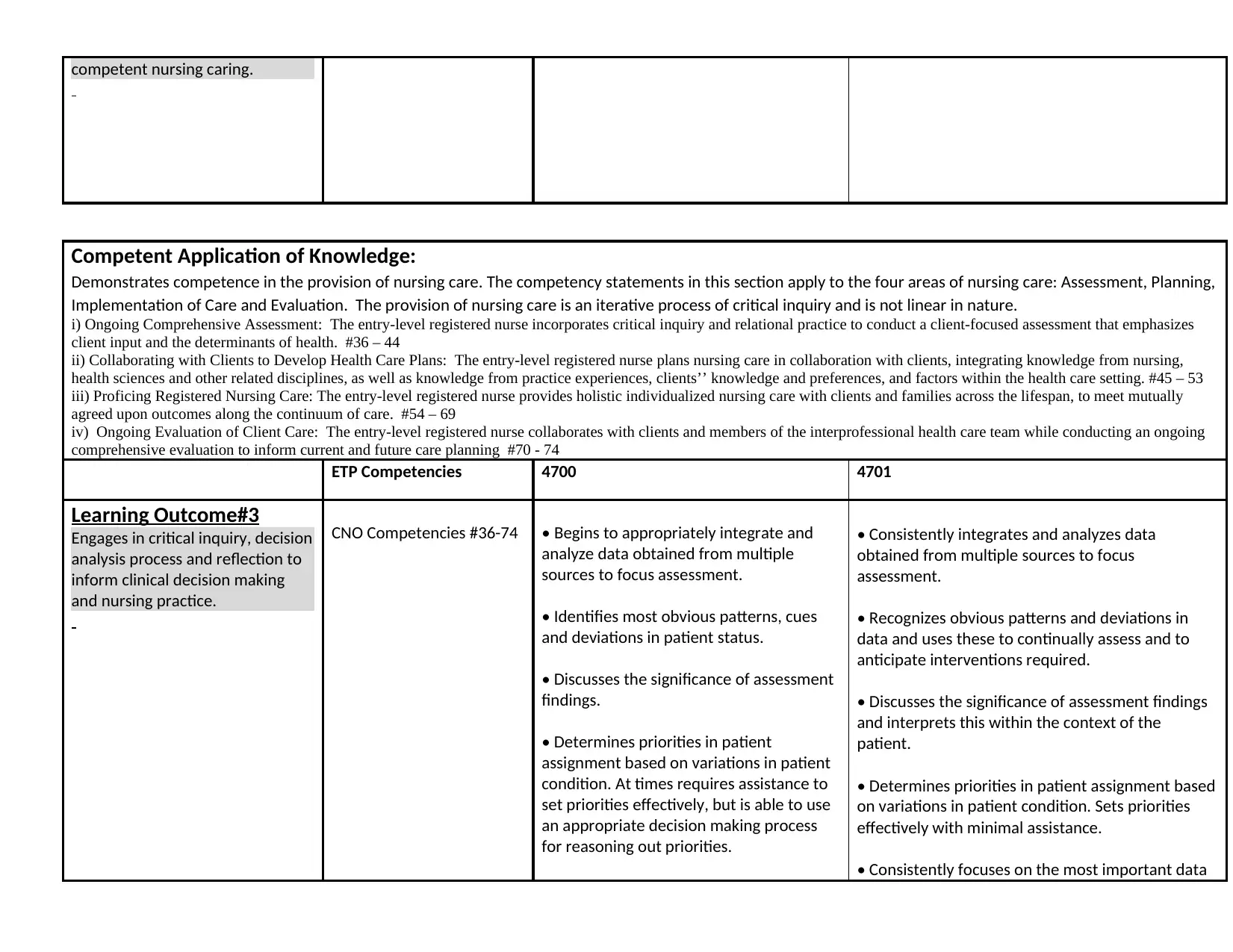
competent nursing caring.
Competent Application of Knowledge:
Demonstrates competence in the provision of nursing care. The competency statements in this section apply to the four areas of nursing care: Assessment, Planning,
Implementation of Care and Evaluation. The provision of nursing care is an iterative process of critical inquiry and is not linear in nature.
i) Ongoing Comprehensive Assessment: The entry-level registered nurse incorporates critical inquiry and relational practice to conduct a client-focused assessment that emphasizes
client input and the determinants of health. #36 – 44
ii) Collaborating with Clients to Develop Health Care Plans: The entry-level registered nurse plans nursing care in collaboration with clients, integrating knowledge from nursing,
health sciences and other related disciplines, as well as knowledge from practice experiences, clients’’ knowledge and preferences, and factors within the health care setting. #45 – 53
iii) Proficing Registered Nursing Care: The entry-level registered nurse provides holistic individualized nursing care with clients and families across the lifespan, to meet mutually
agreed upon outcomes along the continuum of care. #54 – 69
iv) Ongoing Evaluation of Client Care: The entry-level registered nurse collaborates with clients and members of the interprofessional health care team while conducting an ongoing
comprehensive evaluation to inform current and future care planning #70 - 74
ETP Competencies 4700 4701
Learning Outcome#3
Engages in critical inquiry, decision
analysis process and reflection to
inform clinical decision making
and nursing practice.
CNO Competencies #36-74 • Begins to appropriately integrate and
analyze data obtained from multiple
sources to focus assessment.
• Identifies most obvious patterns, cues
and deviations in patient status.
• Discusses the significance of assessment
findings.
• Determines priorities in patient
assignment based on variations in patient
condition. At times requires assistance to
set priorities effectively, but is able to use
an appropriate decision making process
for reasoning out priorities.
• Consistently integrates and analyzes data
obtained from multiple sources to focus
assessment.
• Recognizes obvious patterns and deviations in
data and uses these to continually assess and to
anticipate interventions required.
• Discusses the significance of assessment findings
and interprets this within the context of the
patient.
• Determines priorities in patient assignment based
on variations in patient condition. Sets priorities
effectively with minimal assistance.
• Consistently focuses on the most important data
Competent Application of Knowledge:
Demonstrates competence in the provision of nursing care. The competency statements in this section apply to the four areas of nursing care: Assessment, Planning,
Implementation of Care and Evaluation. The provision of nursing care is an iterative process of critical inquiry and is not linear in nature.
i) Ongoing Comprehensive Assessment: The entry-level registered nurse incorporates critical inquiry and relational practice to conduct a client-focused assessment that emphasizes
client input and the determinants of health. #36 – 44
ii) Collaborating with Clients to Develop Health Care Plans: The entry-level registered nurse plans nursing care in collaboration with clients, integrating knowledge from nursing,
health sciences and other related disciplines, as well as knowledge from practice experiences, clients’’ knowledge and preferences, and factors within the health care setting. #45 – 53
iii) Proficing Registered Nursing Care: The entry-level registered nurse provides holistic individualized nursing care with clients and families across the lifespan, to meet mutually
agreed upon outcomes along the continuum of care. #54 – 69
iv) Ongoing Evaluation of Client Care: The entry-level registered nurse collaborates with clients and members of the interprofessional health care team while conducting an ongoing
comprehensive evaluation to inform current and future care planning #70 - 74
ETP Competencies 4700 4701
Learning Outcome#3
Engages in critical inquiry, decision
analysis process and reflection to
inform clinical decision making
and nursing practice.
CNO Competencies #36-74 • Begins to appropriately integrate and
analyze data obtained from multiple
sources to focus assessment.
• Identifies most obvious patterns, cues
and deviations in patient status.
• Discusses the significance of assessment
findings.
• Determines priorities in patient
assignment based on variations in patient
condition. At times requires assistance to
set priorities effectively, but is able to use
an appropriate decision making process
for reasoning out priorities.
• Consistently integrates and analyzes data
obtained from multiple sources to focus
assessment.
• Recognizes obvious patterns and deviations in
data and uses these to continually assess and to
anticipate interventions required.
• Discusses the significance of assessment findings
and interprets this within the context of the
patient.
• Determines priorities in patient assignment based
on variations in patient condition. Sets priorities
effectively with minimal assistance.
• Consistently focuses on the most important data
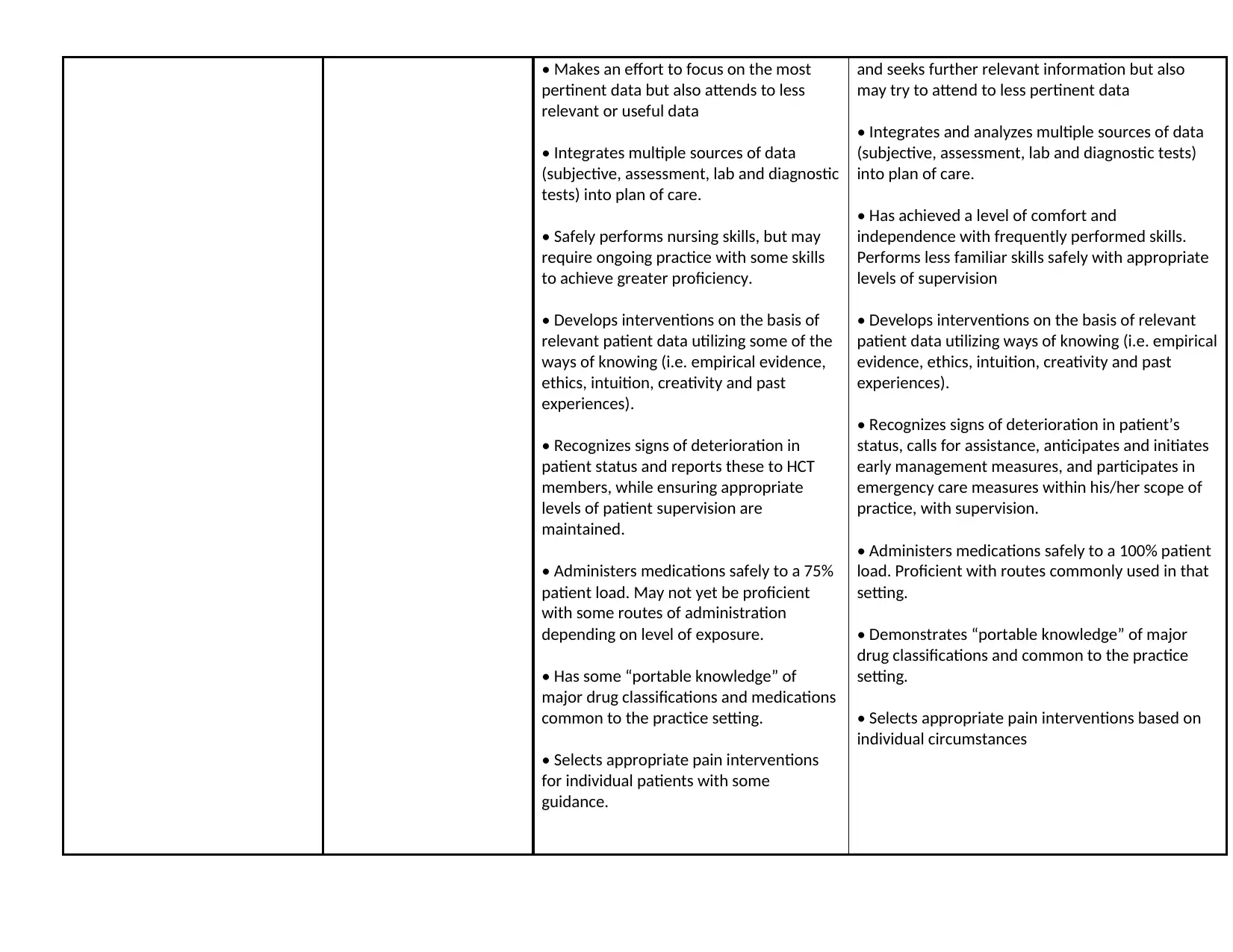
• Makes an effort to focus on the most
pertinent data but also attends to less
relevant or useful data
• Integrates multiple sources of data
(subjective, assessment, lab and diagnostic
tests) into plan of care.
• Safely performs nursing skills, but may
require ongoing practice with some skills
to achieve greater proficiency.
• Develops interventions on the basis of
relevant patient data utilizing some of the
ways of knowing (i.e. empirical evidence,
ethics, intuition, creativity and past
experiences).
• Recognizes signs of deterioration in
patient status and reports these to HCT
members, while ensuring appropriate
levels of patient supervision are
maintained.
• Administers medications safely to a 75%
patient load. May not yet be proficient
with some routes of administration
depending on level of exposure.
• Has some “portable knowledge” of
major drug classifications and medications
common to the practice setting.
• Selects appropriate pain interventions
for individual patients with some
guidance.
and seeks further relevant information but also
may try to attend to less pertinent data
• Integrates and analyzes multiple sources of data
(subjective, assessment, lab and diagnostic tests)
into plan of care.
• Has achieved a level of comfort and
independence with frequently performed skills.
Performs less familiar skills safely with appropriate
levels of supervision
• Develops interventions on the basis of relevant
patient data utilizing ways of knowing (i.e. empirical
evidence, ethics, intuition, creativity and past
experiences).
• Recognizes signs of deterioration in patient’s
status, calls for assistance, anticipates and initiates
early management measures, and participates in
emergency care measures within his/her scope of
practice, with supervision.
• Administers medications safely to a 100% patient
load. Proficient with routes commonly used in that
setting.
• Demonstrates “portable knowledge” of major
drug classifications and common to the practice
setting.
• Selects appropriate pain interventions based on
individual circumstances
pertinent data but also attends to less
relevant or useful data
• Integrates multiple sources of data
(subjective, assessment, lab and diagnostic
tests) into plan of care.
• Safely performs nursing skills, but may
require ongoing practice with some skills
to achieve greater proficiency.
• Develops interventions on the basis of
relevant patient data utilizing some of the
ways of knowing (i.e. empirical evidence,
ethics, intuition, creativity and past
experiences).
• Recognizes signs of deterioration in
patient status and reports these to HCT
members, while ensuring appropriate
levels of patient supervision are
maintained.
• Administers medications safely to a 75%
patient load. May not yet be proficient
with some routes of administration
depending on level of exposure.
• Has some “portable knowledge” of
major drug classifications and medications
common to the practice setting.
• Selects appropriate pain interventions
for individual patients with some
guidance.
and seeks further relevant information but also
may try to attend to less pertinent data
• Integrates and analyzes multiple sources of data
(subjective, assessment, lab and diagnostic tests)
into plan of care.
• Has achieved a level of comfort and
independence with frequently performed skills.
Performs less familiar skills safely with appropriate
levels of supervision
• Develops interventions on the basis of relevant
patient data utilizing ways of knowing (i.e. empirical
evidence, ethics, intuition, creativity and past
experiences).
• Recognizes signs of deterioration in patient’s
status, calls for assistance, anticipates and initiates
early management measures, and participates in
emergency care measures within his/her scope of
practice, with supervision.
• Administers medications safely to a 100% patient
load. Proficient with routes commonly used in that
setting.
• Demonstrates “portable knowledge” of major
drug classifications and common to the practice
setting.
• Selects appropriate pain interventions based on
individual circumstances
⊘ This is a preview!⊘
Do you want full access?
Subscribe today to unlock all pages.

Trusted by 1+ million students worldwide
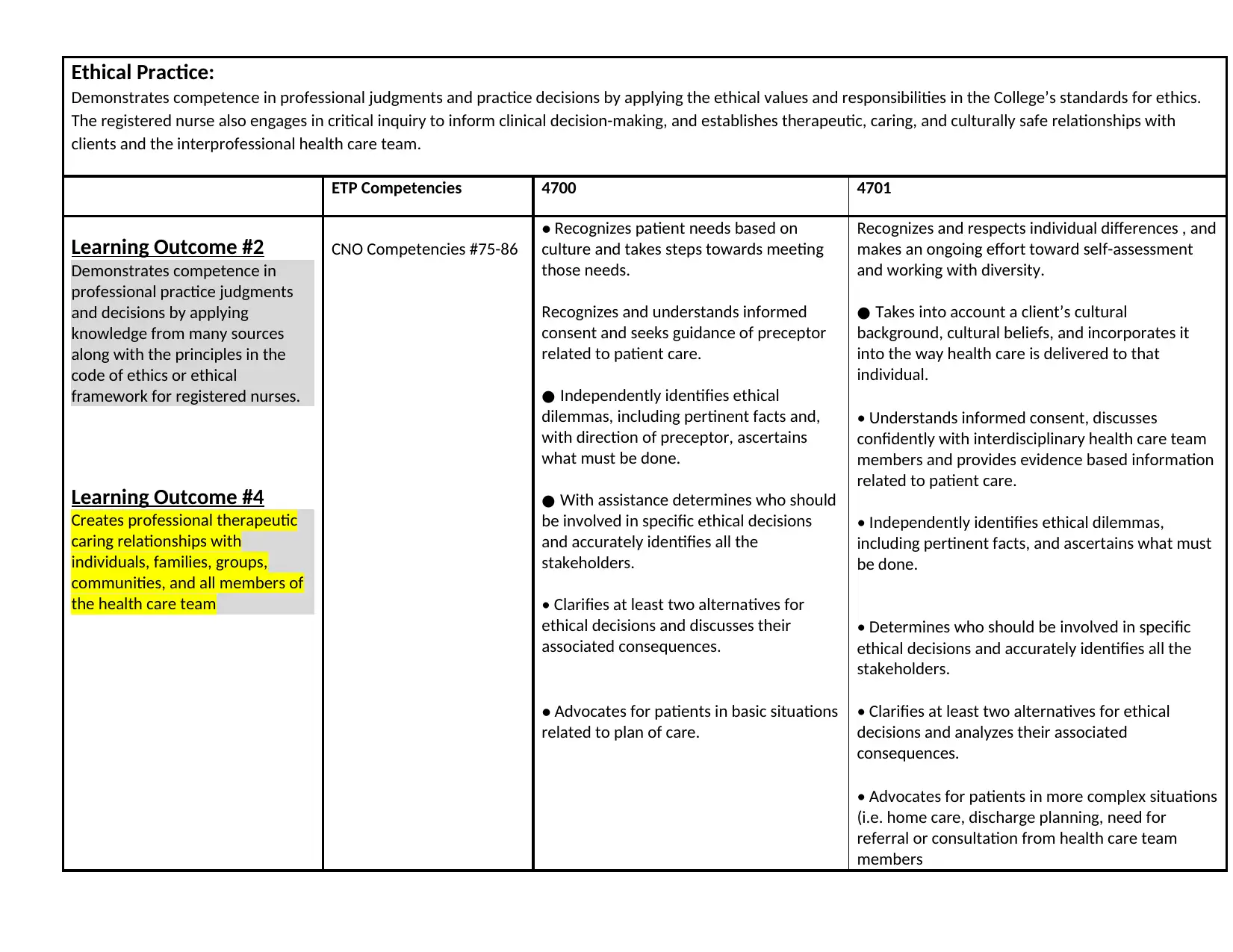
Ethical Practice:
Demonstrates competence in professional judgments and practice decisions by applying the ethical values and responsibilities in the College’s standards for ethics.
The registered nurse also engages in critical inquiry to inform clinical decision-making, and establishes therapeutic, caring, and culturally safe relationships with
clients and the interprofessional health care team.
ETP Competencies 4700 4701
Learning Outcome #2
Demonstrates competence in
professional practice judgments
and decisions by applying
knowledge from many sources
along with the principles in the
code of ethics or ethical
framework for registered nurses.
Learning Outcome #4
Creates professional therapeutic
caring relationships with
individuals, families, groups,
communities, and all members of
the health care team
CNO Competencies #75-86
● Recognizes patient needs based on
culture and takes steps towards meeting
those needs.
Recognizes and understands informed
consent and seeks guidance of preceptor
related to patient care.
● Independently identifies ethical
dilemmas, including pertinent facts and,
with direction of preceptor, ascertains
what must be done.
● With assistance determines who should
be involved in specific ethical decisions
and accurately identifies all the
stakeholders.
• Clarifies at least two alternatives for
ethical decisions and discusses their
associated consequences.
● Advocates for patients in basic situations
related to plan of care.
Recognizes and respects individual differences , and
makes an ongoing effort toward self-assessment
and working with diversity.
● Takes into account a client’s cultural
background, cultural beliefs, and incorporates it
into the way health care is delivered to that
individual.
• Understands informed consent, discusses
confidently with interdisciplinary health care team
members and provides evidence based information
related to patient care.
• Independently identifies ethical dilemmas,
including pertinent facts, and ascertains what must
be done.
• Determines who should be involved in specific
ethical decisions and accurately identifies all the
stakeholders.
• Clarifies at least two alternatives for ethical
decisions and analyzes their associated
consequences.
• Advocates for patients in more complex situations
(i.e. home care, discharge planning, need for
referral or consultation from health care team
members
Demonstrates competence in professional judgments and practice decisions by applying the ethical values and responsibilities in the College’s standards for ethics.
The registered nurse also engages in critical inquiry to inform clinical decision-making, and establishes therapeutic, caring, and culturally safe relationships with
clients and the interprofessional health care team.
ETP Competencies 4700 4701
Learning Outcome #2
Demonstrates competence in
professional practice judgments
and decisions by applying
knowledge from many sources
along with the principles in the
code of ethics or ethical
framework for registered nurses.
Learning Outcome #4
Creates professional therapeutic
caring relationships with
individuals, families, groups,
communities, and all members of
the health care team
CNO Competencies #75-86
● Recognizes patient needs based on
culture and takes steps towards meeting
those needs.
Recognizes and understands informed
consent and seeks guidance of preceptor
related to patient care.
● Independently identifies ethical
dilemmas, including pertinent facts and,
with direction of preceptor, ascertains
what must be done.
● With assistance determines who should
be involved in specific ethical decisions
and accurately identifies all the
stakeholders.
• Clarifies at least two alternatives for
ethical decisions and discusses their
associated consequences.
● Advocates for patients in basic situations
related to plan of care.
Recognizes and respects individual differences , and
makes an ongoing effort toward self-assessment
and working with diversity.
● Takes into account a client’s cultural
background, cultural beliefs, and incorporates it
into the way health care is delivered to that
individual.
• Understands informed consent, discusses
confidently with interdisciplinary health care team
members and provides evidence based information
related to patient care.
• Independently identifies ethical dilemmas,
including pertinent facts, and ascertains what must
be done.
• Determines who should be involved in specific
ethical decisions and accurately identifies all the
stakeholders.
• Clarifies at least two alternatives for ethical
decisions and analyzes their associated
consequences.
• Advocates for patients in more complex situations
(i.e. home care, discharge planning, need for
referral or consultation from health care team
members
Paraphrase This Document
Need a fresh take? Get an instant paraphrase of this document with our AI Paraphraser
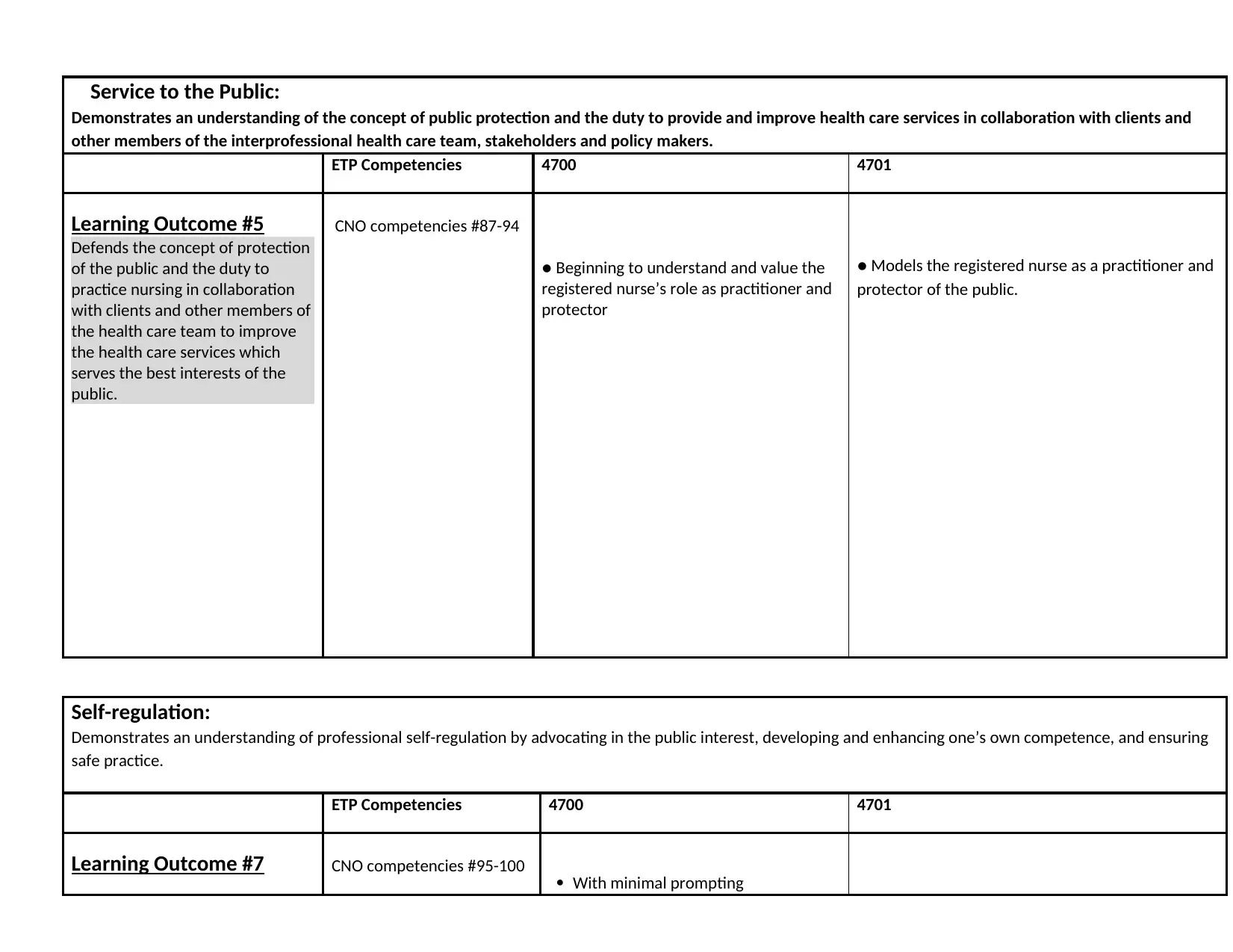
Service to the Public:
Demonstrates an understanding of the concept of public protection and the duty to provide and improve health care services in collaboration with clients and
other members of the interprofessional health care team, stakeholders and policy makers.
ETP Competencies 4700 4701
Learning Outcome #5
Defends the concept of protection
of the public and the duty to
practice nursing in collaboration
with clients and other members of
the health care team to improve
the health care services which
serves the best interests of the
public.
CNO competencies #87-94
● Beginning to understand and value the
registered nurse’s role as practitioner and
protector
● Models the registered nurse as a practitioner and
protector of the public.
Self-regulation:
Demonstrates an understanding of professional self-regulation by advocating in the public interest, developing and enhancing one’s own competence, and ensuring
safe practice.
ETP Competencies 4700 4701
Learning Outcome #7 CNO competencies #95-100 With minimal prompting
Demonstrates an understanding of the concept of public protection and the duty to provide and improve health care services in collaboration with clients and
other members of the interprofessional health care team, stakeholders and policy makers.
ETP Competencies 4700 4701
Learning Outcome #5
Defends the concept of protection
of the public and the duty to
practice nursing in collaboration
with clients and other members of
the health care team to improve
the health care services which
serves the best interests of the
public.
CNO competencies #87-94
● Beginning to understand and value the
registered nurse’s role as practitioner and
protector
● Models the registered nurse as a practitioner and
protector of the public.
Self-regulation:
Demonstrates an understanding of professional self-regulation by advocating in the public interest, developing and enhancing one’s own competence, and ensuring
safe practice.
ETP Competencies 4700 4701
Learning Outcome #7 CNO competencies #95-100 With minimal prompting
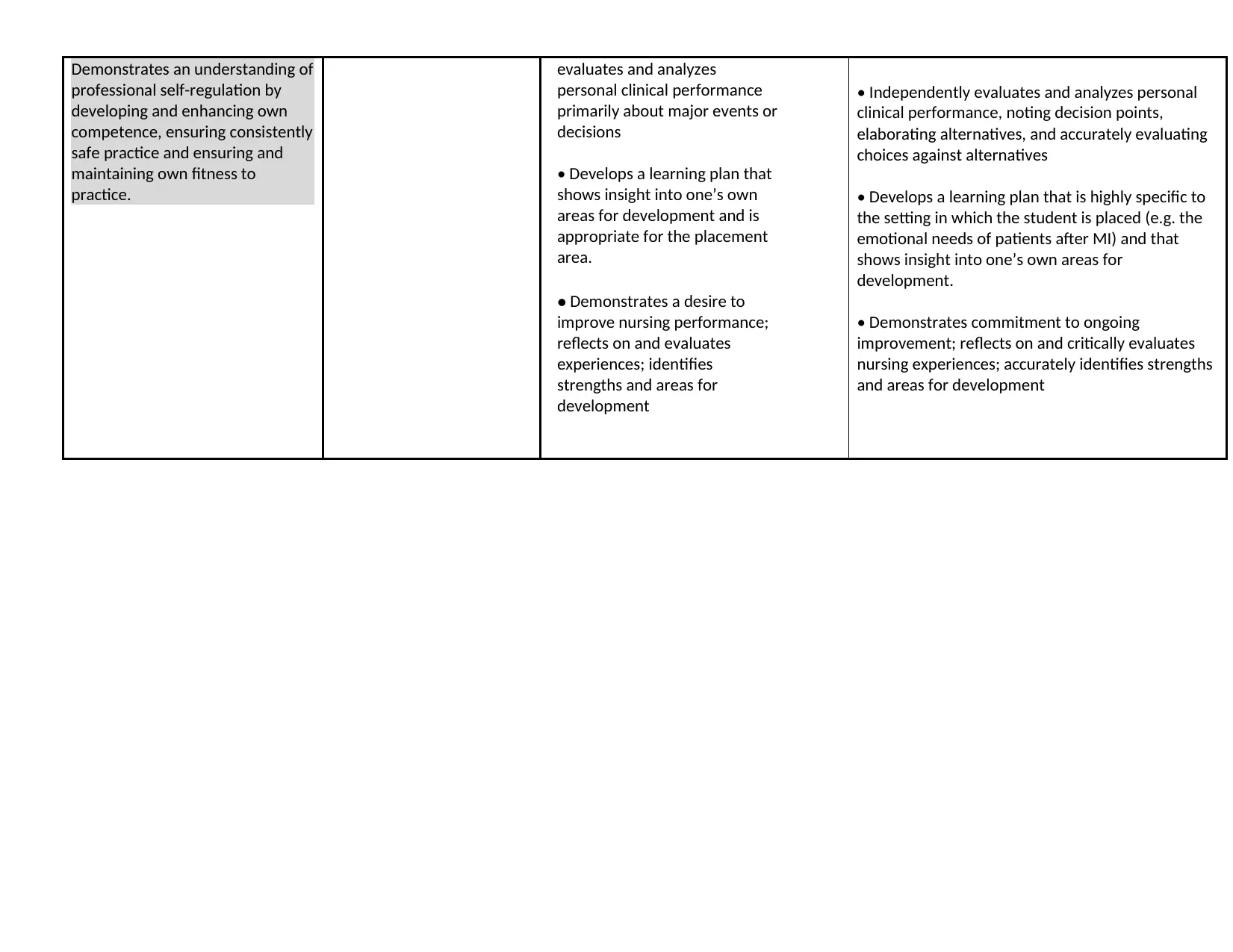
Demonstrates an understanding of
professional self-regulation by
developing and enhancing own
competence, ensuring consistently
safe practice and ensuring and
maintaining own fitness to
practice.
evaluates and analyzes
personal clinical performance
primarily about major events or
decisions
• Develops a learning plan that
shows insight into one’s own
areas for development and is
appropriate for the placement
area.
● Demonstrates a desire to
improve nursing performance;
reflects on and evaluates
experiences; identifies
strengths and areas for
development
• Independently evaluates and analyzes personal
clinical performance, noting decision points,
elaborating alternatives, and accurately evaluating
choices against alternatives
• Develops a learning plan that is highly specific to
the setting in which the student is placed (e.g. the
emotional needs of patients after MI) and that
shows insight into one’s own areas for
development.
• Demonstrates commitment to ongoing
improvement; reflects on and critically evaluates
nursing experiences; accurately identifies strengths
and areas for development
professional self-regulation by
developing and enhancing own
competence, ensuring consistently
safe practice and ensuring and
maintaining own fitness to
practice.
evaluates and analyzes
personal clinical performance
primarily about major events or
decisions
• Develops a learning plan that
shows insight into one’s own
areas for development and is
appropriate for the placement
area.
● Demonstrates a desire to
improve nursing performance;
reflects on and evaluates
experiences; identifies
strengths and areas for
development
• Independently evaluates and analyzes personal
clinical performance, noting decision points,
elaborating alternatives, and accurately evaluating
choices against alternatives
• Develops a learning plan that is highly specific to
the setting in which the student is placed (e.g. the
emotional needs of patients after MI) and that
shows insight into one’s own areas for
development.
• Demonstrates commitment to ongoing
improvement; reflects on and critically evaluates
nursing experiences; accurately identifies strengths
and areas for development
⊘ This is a preview!⊘
Do you want full access?
Subscribe today to unlock all pages.

Trusted by 1+ million students worldwide
1 out of 6
Related Documents
Your All-in-One AI-Powered Toolkit for Academic Success.
+13062052269
info@desklib.com
Available 24*7 on WhatsApp / Email
![[object Object]](/_next/static/media/star-bottom.7253800d.svg)
Unlock your academic potential
Copyright © 2020–2026 A2Z Services. All Rights Reserved. Developed and managed by ZUCOL.





